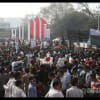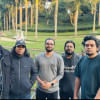How many Indigenous authors can you name?

Let me begin with the famous quote often attributed to anti-Apartheid icon Nelson Mandela: "If you talk to a man in a language he understands, that goes to his head. If you talk to him in his language, that goes to his heart."
This quote underscores the deep connection between language and culture, highlighting the significant role language plays in our lives. When a language is lost, a culture is also lost. Unfortunately, despite the rich diversity of ethnic minorities and Indigenous peoples in Bangladesh, efforts to promote Indigenous languages and literature have been insufficient. Take, for example, the annual Amar Ekushey Book Fair. While Bangla Academy has been organising the fair since 1978, there has been a noticeable lack of initiatives to promote Indigenous literature, such as the absence of a dedicated corner for Indigenous authors. As a result, many of us are unfamiliar with Indigenous folktales or historical narratives, and few can name Indigenous writers.
Despite these challenges, there are some publications which are actively promoting Indigenous cultures. One such example is Thokbirim, a publication owned by a member of the Garo community. Thokbirim sets up a stall every year at the "Little Mag" corner of the fair, showcasing books by Indigenous writers. Additionally, the publication organises the "Garo Book Fair" in Dhaka, providing a platform for Indigenous authors. However, these initiatives lack proper support and sponsorship from relevant authorities.
Furthermore, there is a lack of recognition for Indigenous writers and publishers at national events like the Amar Ekushey Book Fair. While awards are given to the best writers and publication houses, there are no separate awards for Indigenous contributors.
If we look at other countries, we can learn how to create an environment conducive to the thriving of Indigenous writers. The Blak & Bright First Nations Literary Festival, based in Melbourne, Australia, is a prominent festival that celebrates and showcases the rich diversity of Indigenous Australian literature, storytelling, and cultures. The festival programme features a diverse range of events, including author talks, panel discussions, readings, workshops, performances, and exhibitions that go on for several days. Attendees get to engage with Indigenous authors and artists, explore Indigenous storytelling traditions, and participate in discussions about Indigenous literature and cultures.
Where are such festivals in our country? Who will support them here? Indigenous writers in our country need more platforms to express their views and contribute to the literary world, adding diversity.
According to the cultural affairs ministry's latest annual report, there are 10 institutions in the country dedicated to promoting the cultures of ethnic minorities. While this is a commendable effort, these institutions primarily focus on celebrating festivals and conducting workshops at the local level. Much more needs to be done to spread awareness of Indigenous cultures on a national scale.
The issue of language extinction is also a pressing concern for its lack of patronisation. According to the International Mother Language Institute (IMLI), 14 ethnic languages in Bangladesh are on the verge of extinction. If this trend continues, the cultural diversity of our country will be greatly diminished.
The UN Permanent Forum on Indigenous Issues (UNPFII) warns that more than half of the world's languages could become extinct by 2100, with Indigenous languages being particularly at risk. Language is central to the identity of Indigenous peoples, and when languages are lost, so too are Indigenous cultures. Therefore, realising the situation, the United Nations General Assembly proclaimed the period of 2022-2032 as the International Decade of Indigenous Languages to draw global attention to the critical situation of many Indigenous languages and to mobilise stakeholders and resources for their preservation, revitalisation, and promotion.
Also, as a part of celebrating International Mother Language Day this year, Unesco declared its theme to be "Multilingual education is a pillar of intergenerational learning." The theme talks about the importance of multilingual education in the transfer of knowledge and cultural heritage between generations, and it will be possible if we allow the mother tongues of Indigenous peoples to find its expression in different forms such as literature.
The existence of Indigenous peoples is at stake in every aspect globally. The Bangladesh government needs to take some immediate and proactive measures to counter this at home. To this end, it is imperative that Indigenous literature and languages are promoted at national festivals and events. By doing so, we can encourage new writers and publishers, preserve cultural diversity, and ensure the survival of Indigenous languages for future generations.
Mathews Chiran, who belongs to the Indigenous Garo community in Bangladesh, is a development practitioner.
Views expressed in this article are the author's own.
Follow The Daily Star Opinion on Facebook for the latest opinions, commentaries and analyses by experts and professionals. To contribute your article or letter to The Daily Star Opinion, see our guidelines for submission.

 For all latest news, follow The Daily Star's Google News channel.
For all latest news, follow The Daily Star's Google News channel. 










Comments